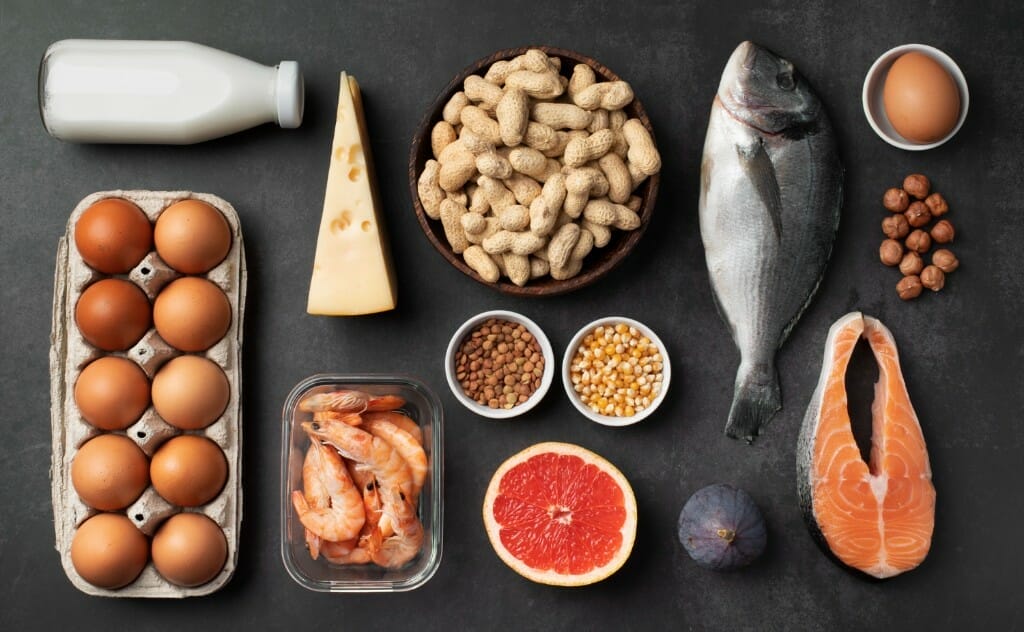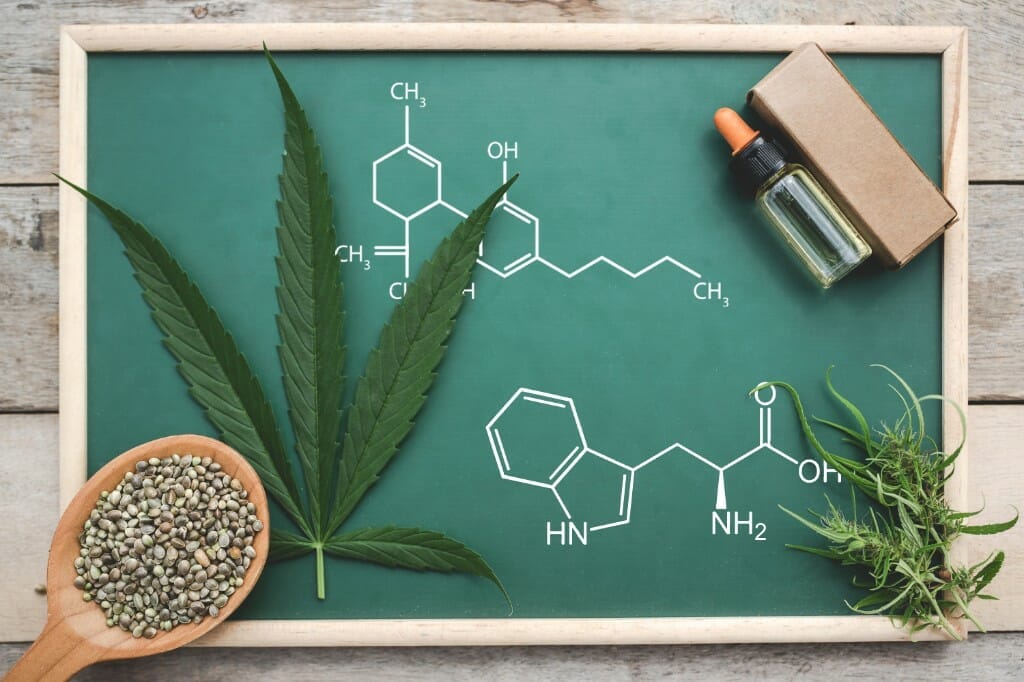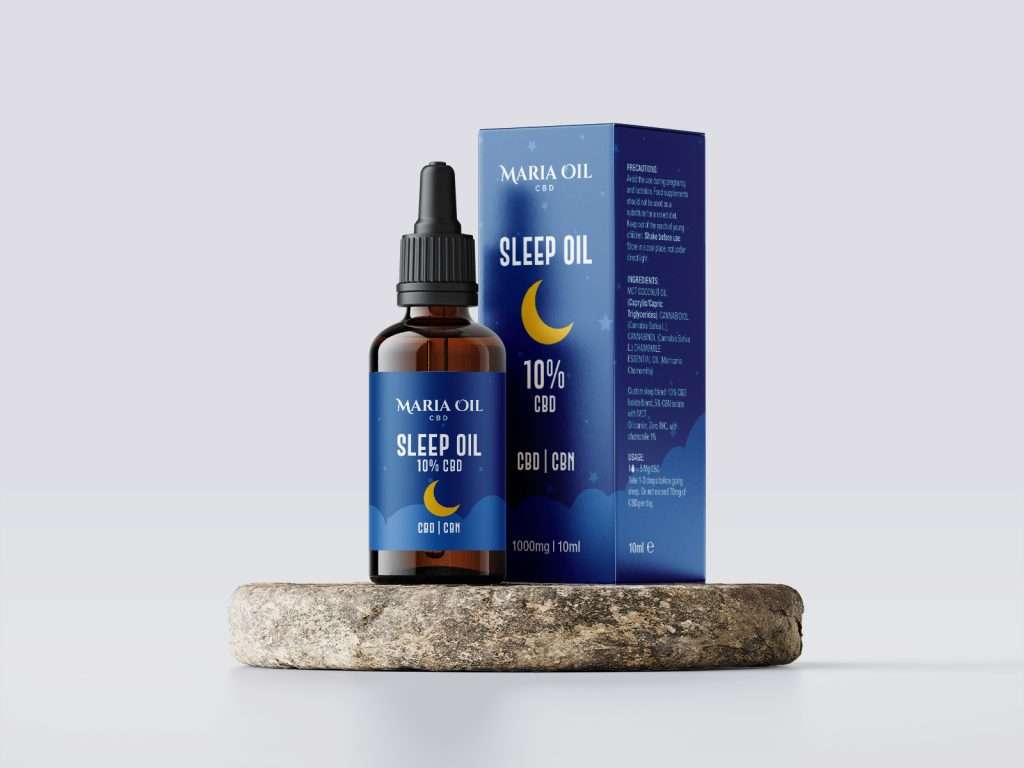Tryptophan, melatonin and CBD: what do these three compounds have in common? The fact that they positively influence our mood, our sleep and our general health.
Tryptophan is an essential amino acid responsible for converting into serotonin, the hormone of happiness, which regulates our emotions, appetite and sex drive. Serotonin, in turn, is the precursor to melatonin, the sleep hormone, which regulates our circadian rhythm and helps us sleep well and get a good night’s rest.
Melatonin has many beneficial effects on our health: besides promoting sleep, it has antioxidant, anti-inflammatory, immunomodulatory and neuroprotective properties. It can also prevent or alleviate certain disorders such as insomnia, jet lag, anxiety, depression, headaches and neurodegenerative diseases.
And CBD? It is a cannabinoid with anxiolytic, antidepressant, anticonvulsant, anti-inflammatory and analgesic effects.
But what we are interested in here is that CBD can also enhance the effects of serotonin and melatonin, thus promoting good mood and rest.
As you can see, tryptophan, melatonin and CBD are three natural allies for mental and physical health. Taking these compounds can help you improve your quality of life and prevent or treat some common ailments.But let’s find out more about tryptophan’s relationship with melatonin and, subsequently, with CBD.
What is tryptophan?
Tryptophan is one of the 20 amino acids that make up proteins, which are essential for the structure and function of tissues and organs in our bodies.
However, it is an essential amino acid, so it is a molecule that our body does not synthesise on its own. This means that it must be taken up externally via the diet.
Tryptophan deficiency can cause health problems such as depression, insomnia and obesity. Therefore, a balanced diet that includes tryptophan-rich foods such as meat, fish, eggs, legumes, whole grains and dried fruit can provide our bodies with the necessary amount of this essential amino acid.Tryptophan can also be taken as a food supplement in combination with a balanced diet as a treatment for one of the conditions just listed or, more simply, to prevent them from occurring.
What does tryptophan produce?
What happens in our body when we take tryptophan? This essential amino acid is crucial for our mental and physical well-being because, as we mentioned earlier, it produces two very important hormones: serotonin and melatonin.
Serotonin is known as the ‘feel-good hormone’ because it influences our mood, self-esteem and motivation. Serotonin also helps us regulate our appetite, sexual desire and body temperature.
But how is serotonin formed? Thanks to tryptophan, which is converted into serotonin by the body when it needs it.
Melatonin, on the other hand, is the sleep hormone because it helps us get a good night’s sleep and rest. It is produced by the pineal gland in the brain during the night, when it is dark.
But how is melatonin formed? Again, thanks to tryptophan, which is converted into serotonin and then into melatonin by the body.
What are the side effects of tryptophan?
According to what we have said so far, tryptophan appears to have a large number of beneficial effects on the body.
But beware: tryptophan supplements are not harmless and can have unwanted side effects if taken in excessive doses or in combination with other drugs or substances.Among the most common side effects are:
- Nausea;
- Diarrhoea;
- Agitation;
- Nervousness;
- Blood pressure fluctuation;
- Drowsiness.
In addition, tryptophan may interact negatively with some antidepressants that act on serotonin, such as selective serotonin reuptake inhibitors (SSRIs) or monoamine oxidase inhibitors (MAOIs), increasing the risk of a life-threatening serotonergic syndrome.For this reason, before taking tryptophan supplements, it is always a good idea to consult your doctor and follow his or her instructions on dosage and mode of use. All the more reason why you should do so if you are already on medication to treat a disorder and want to supplement your tryptophan intake.
When should tryptophan be taken?
The administration of tryptophan can vary depending on the purpose of intake. In general, it can be taken at any time of the day and whenever you want to rebalance your body.
However, there are specific cases in which taking tryptophan can make a difference. You can take tryptophan for:
- Promoting sleep: at the beginning, we opened the discussion by talking about tryptophan’s relationship with melatonin, which is why it is often counted among the solutions against insomnia and it is advisable to take it about 30-60 minutes before bedtime;
- Improving mood: taking tryptophan can help improve mood and reduce anxiety, the best time to take it depends on individual needs, however, it is recommended to avoid taking it on an empty stomach;
- Reduce hunger: tryptophan can be used to reduce hunger and appetite, in which case you can take it about 30 minutes before meals;
- Improving sports performance: some athletes take tryptophan to improve sports performance; to do so, they take it about 1-2 hours before physical activity.
In any case, it is important to always consult a doctor before taking tryptophan or any other dietary supplement. These are just general indications that can help you understand in which situations the compound is useful.

What foods are rich in tryptophan?
We have said that tryptophan must be taken through diet or supplements. Let’s start by talking about diet.
There are many foods that contain tryptophan, including:
- Meat: chicken, turkey, pork, beef;
- Fish: salmon, tuna, sardines;
- Cheeses: cheddar, grana, feta, brie;
- Eggs: whole eggs, especially the yolk, are a good source of tryptophan;
- Legumes: chickpeas, beans, lentils;
- Nuts and seeds: almonds, Brazil nuts, pumpkin seeds;
- Fruit: banana, pineapple;
- Vegetables: spinach, broccoli;
- Cereals: brown rice, barley, oats.
Remember, however, that the presence of tryptophan in food can vary depending on the amount of protein in the food and its digestibility.
In addition, some sources of tryptophan are often consumed in combination with other foods that may affect their absorption. For instance, carbohydrates may help facilitate the absorption of tryptophan in the brain, thus increasing serotonin levels.
In any case, if you want to obtain the benefits of tryptophan through nutrition, it is important to eat a balanced and varied diet that includes high-quality protein sources and essential nutrients.

What is the link between tryptophan and CBD
What is it that links tryptophan and CBD? Actually, they are two different and not directly related substances.However, both substances can have beneficial effects on mental and physical health, and there are some theories suggesting a possible link between them.
Tryptophan, as we have already seen, is an essential amino acid that our body uses to produce serotonin and melatonin, two neurotransmitters important for regulating mood, sleep and emotions.
CBD, on the other hand, is one of the main non-psychoactive compounds of the cannabis plant, known for its anxiolytic, anti-inflammatory and analgesic properties. CBD interacts with our body’s endocannabinoid system, which is involved in regulating many physiological functions including pain, mood, sleep and appetite, and achieves very similar results. CBD for sleep has also been shown to be as effective as tryptophan.
Some research suggests that CBD may influence serotonin levels in the brain, increasing its availability and improving mood and psychological well-being. In addition, some studies have shown a possible link between regulation of the endocannabinoid system and tryptophan synthesis, suggesting that CBD may affect serotonin production in the brain.
Studies on this topic are still ongoing and the relationship between tryptophan and CBD is the subject of scientific debate, so there is still much to discover.
CBD oil as a sleeping solution
If you suffer from insomnia or have trouble sleeping well, you may have already heard of CBD oil, which can help you sleep better in several ways according to the same principle that links tryptophan with melatonin.First of all, it can alleviate states of anxiety and stress that often prevent one from relaxing and falling asleep. Moreover, it can improve sleep quality by reducing nocturnal awakening episodes and increasing the duration of deep sleep phases. Finally, it can help regulate the circadian rhythm, i.e. the natural cycle of sleep and wakefulness that depends on light and darkness.
CBD oil is an easy and safe way to take cannabidiol. Simply place a few drops under the tongue or add them to your favourite food or drink. The effect is felt after about 30-60 minutes and lasts for several hours.
It also has no psychoactive effects, i.e. it does not cause alterations in perception or consciousness. It is neither addictive nor does it create tolerance.
If you want to try CBD oil as a solution for better sleep, we recommend choosing a quality and certified product.
Maria CBD Oil ‘Sleep Solution’ is ideal for those who want to sleep well and wake up refreshed and full of energy. You can buy it on our official website, where you will also find other useful information about the product and CBD in general.
Don’t miss this opportunity and order your CBD oil now!
 Contact us
Contact us 

